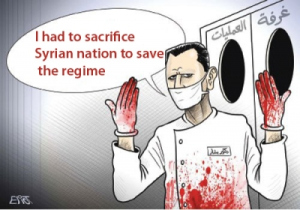 Forces loyal to Syrian President Bashar al-Assad carried out a “massive and coordinated” chemical attack in Damascus on August 21, according a French intelligence report shown to lawmakers on Monday, a government source said.
Forces loyal to Syrian President Bashar al-Assad carried out a “massive and coordinated” chemical attack in Damascus on August 21, according a French intelligence report shown to lawmakers on Monday, a government source said.
The nine-page document – drawn up by France’s military and foreign intelligence services – listed five points that suggested Assad’s fighters were behind the assault, the source told Reuters.
The dossier is central to President Francois Hollande’s calls for Assad to be punished with military action for the reported chemical attack on areas controlled by Syrian rebels during their 2-1/2-year-old uprising.
Britain’s parliament last week voted against taking part in any action against Syria and U.S. President Barack Obama, who also says he thinks Assad’s forces were to blame, has decided to seek Congress approval before any assault.
“This (the attack) poses a major threat to national and global security,” the French source said .
Satellite imagery showed strikes coming from government-controlled areas to the east and west of the Syrian capital and targeting rebel-held zones – areas that have since been bombed to wipe out evidence, the source added.
“Unlike previous attacks that used small amounts of chemicals and were aimed at terrorizing people, this attack was tactical and aimed at regaining territory,” the source said.
Around 47 amateur video clips reportedly filmed on the morning of the attack and showing the impact on civilians had been authenticated by French military doctors, according to the intelligence.
Other French evidence gave details of other suspected chemical attacks, in the towns of Saraqib and Jobar in April, which now appeared to have killed about 280 people, the source said.
Other sources have previously told Reuters that the blood and urine samples used for the intelligence were taken after a Syrian government helicopter dropped munitions on April 29 at Saraqib, near the northern city of Idlib.
France had also been testing for sarin in samples of suspected chemical weapons smuggled out by reporters from the French daily Le Monde at Jobar, near central Damascus, in mid-April.
The source said the intelligence had confirmed those attacks took place.
Reuters

Leave a Reply
You must be logged in to post a comment.